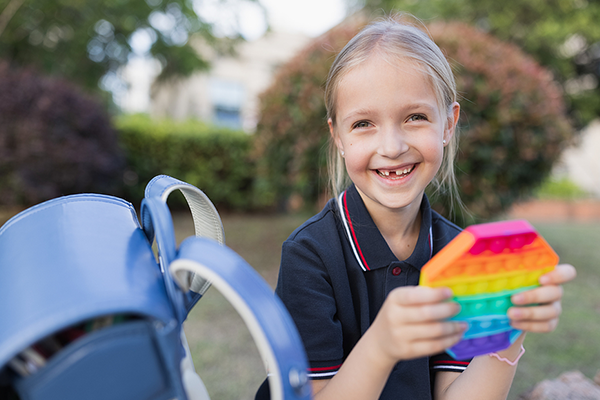1.When to keep your child home sick from school? Nobody wants their child to miss school. However, keeping your child home when sick is important for the proper care of your child as well as for the prevention of spreading contagious illnesses to others. Children should remain home from school when they have a fever, vomiting and/or diarrhea, weeping or open skin sores— especially if not able to be covered with a bandage— and rashes that are accompanied by fever or behavioral changes. If your child is diagnosed with a contagious illness it is advisable to follow your doctor’s instructions about their return to activities. For instance, with bacterial infections like Strep throat, your child is to complete the first 24 hours of treatment with an antibiotic prior to the return of activities. Lastly, check with schools for any specific rules regarding when children need to remain home due to illness.
2.What are some things to do at home that lessen the chances of getting sick at school? We can’t stop all illnesses from affecting our children, but there are some things to do that may help reduce the possibility. Teach your kids to wash their hands with soap and water frequently during the day, but particularly after playing outside, before meal prepping and eating, and after bathroom use. Also, when coughing or sneezing children should remember to cover their mouths or cough into their sleeves since this prevents the spread of bacteria or virus droplets in the surrounding area. Make sure your child understands not to share drinks with others kids. Other tips to keep your body and immune system in good shape include making sure vaccinations are up to date, getting plenty of sleep at night, eating nutritious foods and getting regular physical activity. After all, “an ounce of prevention is worth a pound of cure.”
3.To vaccinate or not to vaccinate? Vaccinate! Vaccines are safe and they are effective at preventing serious bacterial and viral infections in both children and adults.
4.How often should vision and hearing be checked? All children should have a hearing screen done at birth and then formal screenings starting again for ages 4, 5, 6, 8, and 10 years old. One additional screening should be done between years 11-14 , 15-17 and 18-21. During routine health visits, risk assessments for hearing loss should be performed due to any parental concern about a child’s hearing. Formal vision screenings for children should be performed at ages 4, 5, 6, 8, 10, 12 and 15 years old. Risk assessments for any additional vision concerns should be performed at all other routine health visits. Risk assessments help to identify children that may need earlier or more frequent screenings, as well as the need for referrals to specialty care physicians.
5.What are classics symptoms of ADD and ADHD? What is the difference between the two? Everyone has had times when they daydream, feel absent minded, have the fidgets or get too talkative. However, for people with Attention Deficit Hyperactivity Disorder (ADHD), there is a continual pattern of inattention and/or hyperactivity-impulsivity that interferes with functioning, development or social interaction. These symptoms are present in more than one setting (school, home, workplace or other social settings) and symptoms are typically present before 12 years of age and have been occurring for at least 6 months. Currently, doctors and mental health workers use the umbrella diagnosis of ADHD with further notation of 3 types of presentation: primarily inattentive presentation, primarily hyperactive-impulsive presentation or combined presentation when symptoms of both are present. Symptoms of inattention can include not paying attention to details or making careless mistakes, having difficulty organizing tasks, frequently losing things, being forgetful in daily activities, being easily distracted and not listening when being spoken to directly. Symptoms of hyperactivity and impulsivity include fidgeting or squirming in a seat, difficulty playing or doing “quiet play” activities, talking continually, having difficulty waiting to take turns, frequently interrupting others or blurting out answers, being always “on the go” and unable to stay seated when expected.
6.If you suspect your child has ADD or ADHD, what are the next steps? If you suspect your child may have ADHD, or perhaps another learning problem at school, there are steps you can take to further understand what is going on. Meet with your child’s teacher or school representative to get a better idea what they see in the classroom environment as well as to understand any interventions they may have already tried. Also, set up an evaluation with your child’s primary care doctor. This visit may include a detailed history of the child’s problems, a detailed family history for learning problems or mental health disorders, questions about daily routine, sleep habits and stressors at home or school that may affect your child, as well as a physical exam. Part of the medical aspect of the evaluation is to look for other disorders (such as sleep apnea, seizure disorders, anxiety or depression) that cause school performance problems similar to ADHD. There are screening tools used to help evaluate the core symptoms of ADHD, and you and your child’s teachers may be asked to complete them. In addition, more detailed evaluations such as a child study or psychoeducational evaluation can be performed if needed. If diagnosed with ADHD, your child’s doctor will help your family design a treatment plan that’s beneficial for your child as well as discuss options for addressing the ADHD with the school. The treatment goal with ADHD is to help children be successful in school, have good relationships with their parents, teachers and peers and achieve any dream they set their mind to.
 Dr. Kelly Watson, a Pediatric General and Adolescent Medicine physician at the Augusta University Care Center Grovetown, enjoys partnering with families to help them raise healthy children. Her goal is to provide well-rounded care to her patients and their families as she educates, supports and encourages them.
Dr. Kelly Watson, a Pediatric General and Adolescent Medicine physician at the Augusta University Care Center Grovetown, enjoys partnering with families to help them raise healthy children. Her goal is to provide well-rounded care to her patients and their families as she educates, supports and encourages them.




